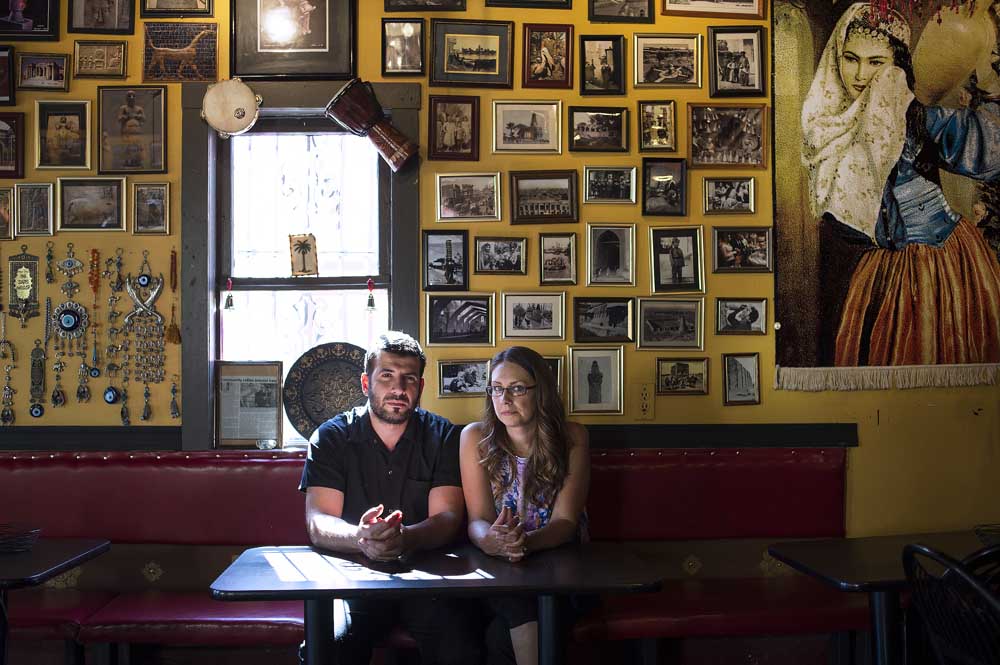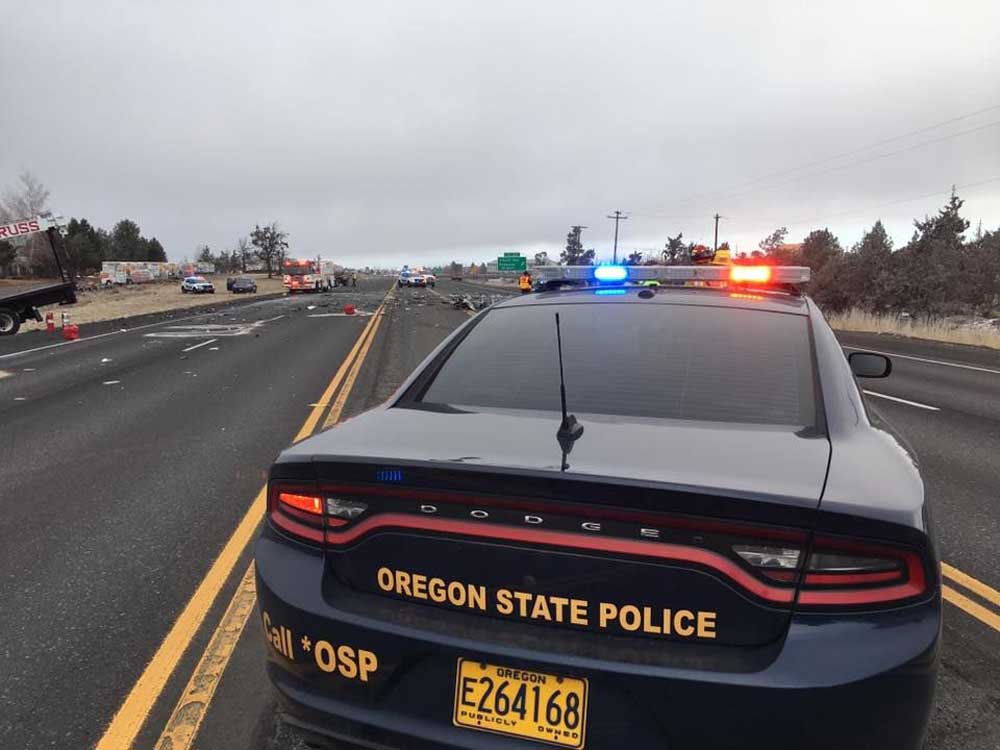Marine’s attack on Iraqi restaurant has some questioning the charges
Published 7:10 am Friday, October 20, 2017

- Gaith and Tiffany Sahib own DarSalam, an Iraqi restaurant in Portland. In April, then-active duty Marine Sergeant Major Damien Rodriguez came to their restaurant, sat without ordering and then hit the staff with a chair. (Amanda Lucier/New York Times photos)
PORTLAND — The DarSalam Iraqi restaurant, with its steaming plates of falafel and kebab, has for years served as a popular community gathering spot here. The Iraqi family who ran it felt welcome in this eclectic city.
But all of that changed one night last spring when a man with a shaved head walked in and took a seat. As other customers chatted, he refused to order, instead staring at photos of the Iraqi countryside on the wall.
After about a half-hour, he got up, walked over to the cash register, began cursing about Iraq, and threw a chair at a waiter’s head, sending him dazed to the floor.
Portland has been on edge over a sharp increase in hate crimes this year. Swastikas showed up on school walls; a mosque received a threatening letter that read “I will enjoy the sight of the blood of you and your fellow vermin running into the streets.” Two men were killed in an attack by an avowed white supremacist on a commuter train.
Determined to take a stand, the authorities came down hard on the restaurant attacker, a 40-year-old California man named Damien Rodriguez. Though similar crimes typically merit misdemeanor charges, lawyers said, prosecutors charged him with felony-level hate crime and assault charges that carry a mandatory prison sentence.
That is where people who know Rodriguez say the case took a wrong turn. Rodriguez was a decorated Marine sergeant major who was forced to retire after his arrest. He had spent years in combat. Friends and family say his actions were not provoked by hate but by post-traumatic stress disorder for which, despite repeated efforts, he never received effective treatment.
As the case unfolded over the summer, it raised questions about what constitutes a hate crime and how effectively the legal system treats combat veterans who suffer from PTSD.
Hundreds of cities across the country have set up special veterans courts devised to offer therapy instead of jail time to wounded veterans, recognizing that treating trauma can be the best way to avoid more crime. But there is a catch: Most courts bar veterans who have committed a violent crime. That is the case in Portland. Because Rodriguez was charged with felony assault, he cannot appear in the veterans court that might offer supervised treatment. Instead, he faces years in prison.
“What he needs is help. That is what he has needed all these years,” said his mother, Roberta Bello. “But they just want to put him away.”
The Iraqi man who owns the restaurant, Ghaith Sahib, said that when his employee was attacked it left him and his staff deeply shaken. A decade ago, Sahib was nearly killed by a car bomb in Baghdad and became a refugee, fleeing to five countries before landing in Portland. The restaurant attack left him worried that he would never really escape the war’s aftermath.
“My family, they have fear now in everything — we can’t forget this,” Sahib said. He said the restaurant was targeted because of his ethnicity, so hate crime charges are fitting. “I feel for this guy, but he cannot do what he does. He must face consequences.”
Both Rodriguez and Sahib are trying to move on from lives upended by war, and both want justice. But they have different ideas of what that means.
Rodriguez, who is white, was raised by a Nigerian stepfather, married a Guatemalan woman, and for years relied on an Iraqi next-door neighbor to help his family when he was fighting overseas. He does not consider himself prejudiced.
“How can they say I hate Iraqis? I gave my soul for Iraq,” he said.
But friends and family say four deployments to war zones left him changed, especially the first one. In 2004 he went to Ramadi, Iraq, as a 27-year-old platoon sergeant. The tour with the 2nd Battalion, 4th Marine Regiment is widely thought to be one of the deadliest six months of any U.S. unit in either Iraq or Afghanistan. Thirty-four Marines were killed and more than 255 were wounded.
Several moments from those months still commandeer Rodriguez’s thoughts, but none more so than the morning of April 6, 2004, when he was leading a dozen Marines down an urban boulevard and rooftops erupted with the flash of gunfire. Hundreds of enemy fighters had launched a coordinated ambush all over the city. By sundown, 12 Marines in the battalion were dead.
In an interview, Rodriguez tried to describe the fight, but stammered and fell silent several times before beginning to cry.
According to other Marines from the squad, the ambush split their group in two, and Rodriguez ordered his half into a house to assess a grim situation. A pair of Marines lay dead in the street. Two more a block away had been hit by a grenade. Reinforcements were bogged down. Enemy fighters were trying to scale the walls into the courtyard of the house. Ammunition was running low.
Pieces of the battle are clear to him more than a decade later: the frantic crackle of the platoon radio, the feeble thumbs-up from a 21-year-old private who had been shot in the neck. The anger he felt after recovering the fly-covered body of a 19-year-old Marine after the battle — a kid who had written a letter to his church saying faith in God would keep him safe.
Other parts are a blur. The citation for a Bronze Star that Rodriguez received for valor says he killed 10 enemy fighters that day. He doesn’t remember clearly.
When he returned home, friends said, Rodriguez seemed drained. He spoke little about what had happened, but couldn’t sleep and drank heavily. He began having visions at night of dead Marines. On anniversaries he visited their graves and weathered the blame from their families. He put in paperwork to award the men Bronze Stars, and hung the citations on his wall.
Many in the battalion were also haunted by the experience, but it was early in the war, and formal PTSD diagnoses were rare, said Winston Jaugan, who was Rodriguez’s friend and, as a gunnery sergeant, his boss. “No one had a diagnosis. They would just give us pills for everything — Valium, Ambien. And we would drink,” he said.
As a leader, other Marines said, Rodriguez carried a particularly heavy burden.
Rodriguez was deployed to Iraq again in 2006, and to Afghanistan in 2010 and 2012.
In between, he repeatedly went to the Marine Corps for help, according to records. Over the years, doctors gave him five different medications to treat anxiety, depression and panic attacks. The Marine Corps eventually diagnosed him with PTSD, but never gave him the type of evidence-based psychotherapy that is widely seen as the best treatment.
Dr. William Nash, head of psychological health for the Marine Corps, said that during the first years of the war, the military did not have enough psychologists to meet the need, and quick, 10-minute consultations, just long enough to prescribe medication, became the default treatment.
Since then the Marine Corps has ramped up treatment significantly, he said. However, he added, getting senior enlisted leaders like Rodriguez to come in for help is a hard sell, because they often see a PTSD diagnosis not just as a risk to promotion, but as an affront to their self-image as tough and self-reliant.
“Sadly, I think they are one of the most underserved groups,” Nash said. “No one has figured out how to treat these guys. No one has figured out how to make their access to care not be damaging to their self-esteem, their career, their identity.”
A number of career-enlisted Marines said troops who have served since 2001 are often suffering, but play down the effects.
“They have been run till the tread is gone and then they keep running on the belts,” said Chris DeMuro, a retired Marine gunnery sergeant who served with Rodriguez. “They have brain injuries, anger issues, most of them are divorced or well on their way, they are alcoholics. But ask about PTSD in that crowd, it’s like a unicorn. You won’t find it.”
The suppressed symptoms push some Marines quietly to the brink, he said, sparking outbursts like the one in the restaurant.
There is no evidence that combat veterans are more prone to committing hate crimes, but studies suggest combat veterans with PTSD commit violent acts at a much higher rate than civilians.








